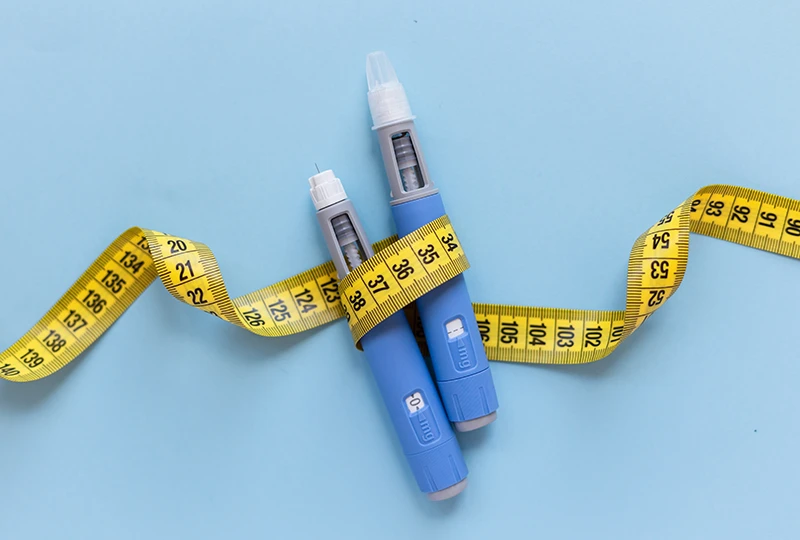by Linda L. Esterson, photography by Nikola Tzenov
Weighing the Costs of Weight Loss Medications
Moving the Needle: New Weight-Loss Medications Prove Popular, but at What Cost?
Tayelor Redding always felt she was overweight and struggled to shed unwanted pounds. She wondered if there was a medical reason, so she consulted her physician.
Bloodwork showed she didn’t have diabetes and also was not prediabetic. She did have polycystic ovary syndrome (PCOS), affecting her hormones. “I was the biggest I had ever been,” she says, recalling this episode from two years ago. “That’s what motivated me to do something.”
Redding, 33, took long walks in her Hampstead neighborhood, committed to exercising and improved her diet, but she didn’t see progress. Advertisements on television, social media and seemingly every source she turned to touted weight-loss medications like Ozempic, Wegovy, Mounjaro and Trulicity. She consulted her physician and learned that insurance doesn’t cover drugs for patients without a medical diagnosis like diabetes, prediabetes or obesity.
The medications are GLP-1, glucagon-like peptide, and mirror a hormone in the body that stimulates insulin secretion in response to food intake and high blood sugar, according to the National Institute of Health’s National Institute of Diabetes and Digestive and Kidney Diseases. This response lowers blood sugar, slows digestion and reduces appetite. The drugs have been used for patients with type 2 diabetes for more than a decade and are now being used by those seeking to lose weight.
The New Class of Weight-Loss Drugs

“The good news is that there is weight loss and improved glucose management. Obesity is a contributing factor to cardiovascular disease and many other chronic and progressive diseases.” – Mary Jane Bembenek, MS, CNS, LDN
According to the Pew Research Center, with obesity rates continuing to rise in the United States and worldwide, the popularity of new weight loss drugs is surging. A Pew Research survey released in 2024 found that with 42% of U.S. adults labeled as obese, 65% of Americans say willpower alone isn’t enough for them to lose weight. A Gallup poll of more than 5,500 adults representing all 50 states and Washington, D.C., conducted in early March 2024, found that 6% of U.S. adults — about 15.5 million people — have used injectable diabetes medications to lose weight. Approximately 64% of users rate the drugs as “extremely effective”
or “effective.”
In 2021, the Food and Drug Administration approved the use of semaglutide, the active ingredient in Wegovy, Ozempic and Rybelsus, for weight management. Following a shortage of the drugs in early 2023, others have come to market, including Zepbound (tirzepatide), which the FDA approved in late 2023.
“The good news is that there is weight loss and improved glucose management,” says Mary Jane Bembenek, MS, CNS, LDN, a certified nutrition specialist and licensed dietitian nutritionist in Mount Airy. “Obesity is a contributing factor to cardiovascular disease and many other chronic and progressive diseases.”
The Price of Weight Loss
Turning to these drugs can be expensive without a medical diagnosis. Wegovy can cost $1,349.02 for a 28-day supply. Similarly, Ozempic runs around $968.52 per month. Savings cards are sometimes available through the manufacturers, but eligibility requirements include medical necessity.
After a friend of Redding’s shared a co-worker’s success, Redding consulted her acquaintance’s medical provider. In November 2023, she received a prescription for a weekly injection of semaglutide. She estimates spending about $1,600 over eight months.
Clothing is another essential cost, Redding says. Throughout her eight-month program, she needed to supplement her wardrobe several times.
Enduring the Side Effects
Cost is not the only challenge. Using the drugs can cause various side effects.
One, gastroparesis, leaves people feeling full because digestion slows. This condition results when stomach contents don’t empty into the small intestine, Bembenek explains. Redding experienced nausea, vomiting, dry heaving, heartburn, terrible stomach aches and constipation, which she knew in advance were a possibility. The side effects made Redding disinterested in food.
“You look at food and think it’s disgusting — I’m dead serious — and have no desire to eat at all,” she says. “If you do eat, your stomach hurts so bad that you don’t even want to eat at all.”
The key was seeing the weight disappear. In the first four months, she lost 40 pounds. Over time, the side effects waned, and some days were barely present.
Redding lost 61 pounds at the end of six months, and the side effects had subsided completely. Redding plateaued and continued for two additional months but stopped in August 2024 after she felt the medication had done its job. She has maintained her weight loss, with periodic fluctuations of five pounds.
Complications

“I would recommend it. It does help, but you have to watch what you eat with it and take it slow.”
– Chelsea Warner
Following the advice of her primary care physician and endocrinologist, Chelsea Warner, 32, started Ozempic in October 2022. She had PCOS and was prediabetic and overweight by about 150 pounds, she says.
The New Windsor resident was prescribed the highest dose — 2 mg — and experienced no changes to her weight during the first two months. But what she experienced were some of the same symptoms as Redding: severe stomach pain, vomiting and regurgitation, acid reflux and blood in her stool. She also endured stomach paralysis and pancreatitis.
After a few more months, she lost 20 pounds, and her blood sugar levels and insulin approached normal levels, but she was ill. Her doctor lowered the dose to 1.5 mg, and with medication, she recovered. Her symptoms also waned.
“I had to be really careful what I ate — no fried foods, no sodas,” says Warner, who pays about $25 out of pocket per month with insurance coverage.
Medication developers also warn of a possible tie to thyroid cancer; however, further research is necessary. Initial studies released on the National Library of Medicine’s PubMed Central have linked the incidence of thyroid cancer to less than 1% in semaglutide-treated patients.
Lifestyle Changes

“[With] starting the medication too early without practicing healthy lifestyle changes, you’re at greater risk of experiencing the side effects and potentially long-term effects that impact the functioning of the organs, the kidney, the liver and the pancreas.”
– Montria Martin, CRNP, FNP-C, LifeBridge Health
Medical experts have historically linked weight loss to proper nutrition and lifestyle changes, and those sentiments are echoed when it comes to these medications.
LifeBridge Health’s Medical Weight Loss Program, based at Northwest Hospital with in-person and virtual visits, promotes lifestyle changes, particularly with diet and exercise, before considering weight loss medications.
“[With] starting the medication too early without practicing healthy lifestyle changes, you’re at greater risk of experiencing the side effects and potentially long-term effects that impact the functioning of the organs, the kidney, the liver and the pancreas,” says Montria Martin, CRNP, FNP-C, medical weight loss nurse practitioner with LifeBridge Health.
Martin notes that building a firm foundation with lifestyle changes includes identifying barriers to losing weight, like the mentality that starvation is necessary, instead of dealing with barriers resulting from the medication “such as a restricted appetite and not being able to eat the bare minimum that’s required to be successful in weight loss.”
Bembenek suggests a daily diet high in protein — up to 0.68 grams per pound of body weight, 25 grams of fiber for women and 38 for men, and 2 to 3 liters of water and non-sugary, low-calorie beverages.
Once patients understand and practice good nutrition and the correct diet, they often realize benefits like controlled blood pressure, controlled cholesterol and weight loss, Martin explains. Only then does she consider adding in a weight loss medication supplementally.
“They see the impact of lifestyle changes on the scale,” she explains. “Off the scale, they experience more energy, more confidence and knowing that they can eat what they thought they had to avoid, as far as carbohydrates are concerned. They also realize they don’t need to fast, follow a ketogenic diet or follow some form of restriction long term.”
Redding acknowledges her success relates to lifestyle changes. She’s eating healthier in small increments and at a slower pace, which she says is significant.
The Associated Stigma
Redding has a few friends on the medication who have kept their participation from their family members. Some are embarrassed about using it, while others are concerned that it may not work for them and don’t want to share their disappointment.
“A lot of people will not tell you they lost weight through Ozempic. They will lie,” she says. “I’ve always been honest about it.”
There’s also the ridicule that she’s taken from some people.
“They make comments saying at least I didn’t take the easy way out,” she adds.
Ultimately Pleased
Redding’s success and improved health have outweighed the costs and side effects. “I feel like I can do so much more,” she says, referencing the part-time work for her family’s construction company and her home bakery business, Taye’s Sweets. “I have the energy to work out, run and walk. I feel lighter and am going to try kickboxing since my arms feel lighter.”
Today, Warner is asymptomatic and maintains a total of 50 pounds of weight loss. She rides horses, walks and enjoys weightlifting. While her weight loss has plateaued, she remains on the medication because it benefits her sugar and insulin levels. She admits she may have started on the highest dose too quickly and hopes she can return to that level in the future to lose another 50 pounds.
“I would recommend it. It does help,” Warner says, “but you have to watch what you eat with it and take it slow.”
The Following Prescription Medications Have Been Approved For Long-Term Use To Treat Obesity
Liraglutide (Saxenda)
Injection | Targets areas of the brain that regulate appetite and food intake. At a lower dose under a different name, Victoza is FDA-approved to treat type 2 diabetes.
Naltrexone-bupropion (Contrave)
Pill | A mix of two medications, naltrexone, which treats alcohol and drug dependence, and bupropion, which treats depression or helps people quit smoking. Reduces hunger and speeds up satiety.
Orlistat (Xenical)
Pill | Works in the gut to reduce fat absorption. Available in a lower dose without prescription
Phentermine-topiramate (Qsymia)
Pill | A mix of two medications, phentermine, which lessens the appetite, and topiramate, which treats seizures and migraines. Reduces hunger and speeds up satiety.
Semaglutide (Wegovy)
Injection | Targets areas of the brain that regulate appetite and food intake. Under different names and dosages, this drug is FDA-approved to treat type 2 diabetes as an injectable medication (Ozempic) and as an oral pill (Rybelsus).
Setmelanotide (IMCIVREE)
Injection | Activates pathways in the brain to decrease appetite and food intake while increasing the number of calories the body uses.
Tirzepatide (Zepbound)
Injection | Targets areas of the brain that regulate appetite and food intake. Under a different name, Mounjaro is FDA-approved to treat type 2 diabetes.
Source: National Institute of Health’s National Institute of Diabetes and Digestive and Kidney Diseases


